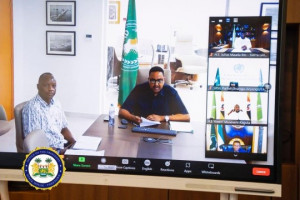By Foday Moriba Conteh
Marking the one-year anniversary of the 2023 General Elections in Sierra Leone, the National Council for Civic Education and Democracy (NaCCED) and the National Commission for Democracy (NCD), with support from IDEA International and the European Union, successfully concluded a two-day National Citizens Dialogue on Governance and Politics. The forum, themed: “Consolidating Democracy by Promoting Inclusive Participation,” gathered stakeholders from across the country and took place on June 24th and 25th, 2024 at the Atlantic Lumley Hotel in Freetown.
In her opening remarks, the Chairperson of the National Commission for Democracy (NCD), Marian Samu, emphasized the importance of the Forum as part of NCD’s tradition to engage citizens in dialogue post-elections, highlighting the necessity of listening to citizens’ perspectives on elections and the electoral process.
She noted that the Forum marked exactly one year since the June 2023 elections, a period characterized by ongoing discussions about national unity and cohesion. The Chairperson further stressed the significance of political parties working together to strengthen Sierra Leone’s democracy.
Addressing concerns about the representation of citizens in the electoral process, she acknowledged ongoing debates but underscored the importance of collective dialogue to evaluate and improve the electoral system. Marian Samu urged participants to reflect on the issues that caused a deadlock in the 2023 elections and to work towards preventing similar occurrences in the future.
Idriss Mamoud Tarawallie, Head of IDEA International Sierra Leone, reflected on the timing of the event, noting its symbolism as it marks one year since the 2023 General Elections, emphasizing the importance of recognizing the progress made over the past year and highlighting the Forum’s focus on positive developments and inclusive dialogue.
He outlined the core areas of focus for IDEA International, emphasizing governance and democratic research, particularly the Global State of Democracy report.
Idriss Mamoud Tarawallie noted the shift from direct democracy to representative democracy and the critical role of citizen participation in governance processes. He praised the significant voter turnout and active participation of citizens in the electoral process, as reported by the Electoral Commission.
Mamoud Tarawallie highlighted Sierra Leone’s strong civil society, rooted in the country’s history, including the civil war and the subsequent introduction of democracy. He underscored the importance of citizens’ rights to participate, belong, and voice their opinions within a framework governed by the rule of law.
He emphasized the importance of constructive citizen engagement in governance and the role of institutions like NaCCED and NCD in facilitating these dialogues.
The Head of IDEA International Sierra Leone affirmed the institution’s dedication to promoting democratic values and supporting citizen engagement across Sierra Leone. He also expressed gratitude for the European Union’s financial support, which made the initiatives possible.
Giving an overview of the dialogue, Kalilu Totangi, Chairman of the National Council for Civic Education and Democracy (NaCCED), stressed the significance of focused attention and participation in the Forum, highlighting its role in strengthening democracy through citizen engagement.
He noted that since the 2023 elections, there has been considerable discussion about the state of democracy in Sierra Leone. The forum, he said, aim to provide a platform for citizens to voice their views on the electoral process and governance.
Reflecting on the success of the Strengthening Democracy Project, Kalilu Totangi praised the high voter turnout and minimal violence during the 2023 elections, attributing that success to efforts in promoting nonviolent participation among young people. However, he acknowledged the challenges that followed the elections, including political disagreements and the need for systemic review.
Kalilu Totangi also criticized the current process of electoral review, which he argued was dominated by political parties rather than the citizens themselves. He called for a more citizen-driven approach to evaluating and improving the electoral system, ensuring that all voices are heard and represented.
He ended up calling for honest an, reflected d constructive discussions to explore ways to improve the electoral and governance systems in Sierra Leone, emphasizing that the ultimate goal of Government is to enhance the well-being and security of its citizens.
In his keynote address, the Chief Electoral Commissioner, Mohamed Kenewui Konneh on a conversation with a prominent civil society advocate in West Africa, highlighting the often-overlooked role of Electoral Commissions’ post-elections.
He referenced renowned scholar, Professor James Robbins, noting that elections are the cornerstone of democracy and the primary means by which citizens engage directly in political processes, stressing the necessity for inclusivity, ensuring that all eligible citizens, including women, men, and persons with disabilities, can participate in the electoral process without barriers.
Mohamed Kenewui Konneh outlined the modern trend towards inclusivity, aimed at eliminating discrimination and fostering participation in all aspects of democracy and governance. He detailed the ECSL’s efforts to promote inclusive electoral processes, citing their strategic plan for 2024, which focuses on strengthening electoral processes for maximum performance.
The former Chief Electoral Commissioner also addressed the issue of voter perception and the role of political parties in shaping public opinion. He called for political parties to actively participate in voter education and to accurately communicate electoral policies to their supporters.
The Chief Electoral Commissioner emphasized the ECSL’s commitment to transparency and collaboration with stakeholders, including political parties, civil society organizations, and the media. He highlighted the importance of accessible electoral information and extensive consultations with all relevant parties. Mohamed Kenewui Konneh stressed the need for continued efforts to foster inclusive participation in electoral processes.
The opening ceremony was followed by panel discussions on consolidating democracy by promoting inclusive participation, group discussions, plenary discussions culminating in the adoption of resolutions and a communiqué aimed at strengthening Sierra Leone’s democracy through inclusive participation.





















